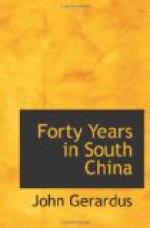The missionaries at Amoy, Messrs. John and Alexander Stronach, London Mission, and Messrs. Doty and Talmage, had very strong convictions on this subject. Their views agreed. Rev. John Stronach was one of the Committee who prepared the “Delegates’ Version.” The views of the brethren at Amoy were diametrically opposed to the decisions of the American Board and American Bible Society. In a long letter of eighty four pages, addressed to Drs. Anderson and De Witt, Oct. 31, 1851, Mr. Talmage sets forth their side of the question. No man can read that document, weighty with learning and charged with moral earnestness, but must feel the profoundest respect for the writer, however he may dissent from his arguments. He concludes as follows:
“Such are our views concerning the use of the words ‘Shin’ and ‘Ling’ as translations of the words ‘God’ and ‘Spirit.’ While we hold ourselves open to conviction, if it can be proved that we are wrong, we at present hold these views firmly. We may not have succeeded in convincing the Prudential Committee that our views are correct, yet we trust we have convinced them that we have given due attention to the subject. We now ask, Can the Prudential Committee expect of us, while we hold such views, to conform to their decision? Would they respect us if we did? We could not respect ourselves. If we could thus trifle with conscientious views on subjects of such importance, we certainly should regard ourselves as being unworthy to be called missionaries of the A. B. C. F. M. or any other Protestant association, and we think the Prudential Committee would also lose confidence in us. We now feel called upon to state our views in reference to the propriety of the various missionary societies and Bible societies and other institutions deciding for us what terms we shall use and what terms we shall not use in preaching the Gospel to the heathen. We shall state our views with the utmost kindness and with all due deference to those from whom we differ. We cannot doubt that the Prudential Committee are willing also and desire us to state our views with the utmost frankness. If our views are incorrect, we desire that others use the same freedom in pointing out our errors. Our views are these:—The societies in the United States and England are not called upon, at least at the present time, to decide this question for us. Those societies which have made such decision have acted prematurely. In deciding this question authoritatively, they are assuming a responsibility which we think they are not called upon to assume. This responsibility belongs properly to the missionaries, and they, we say it with all due respect, are much better qualified to bear this responsibility; for they are better qualified to judge of the evidence and discover the truth in the case. If they are not, then they are not qualified to be missionaries. But whether better qualified or not, they are accountable to a higher power than that




